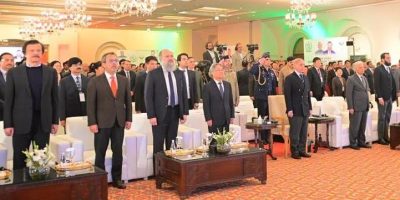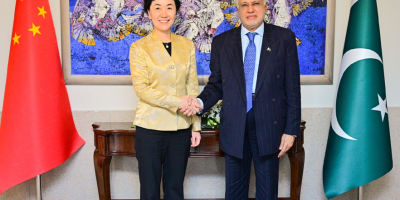Pakistan looks to maximum cooperation with China on agri technology

DNA
ISLAMABAD, Nov. 12: “Pakistani and Chinese researchers are jointly testing hybrid wheat varieties with higher resistance to drought, diseases, and climate uncertainties and higher production per unit area. Our government looks forward to maximum cooperation and coordination with China”, Dr. Ghulam Muhammad Ali, Chairman of Pakistan Agricultural Research Council (PARC).
He told China Economic Net (CEN) in an interview that due to the floods, about $4 billion was lost from wheat damages, with Sindh and Baluchistan being the hardest hit areas.
The government has already imported around 1 million tons of wheat for local consumption, and more will be imported. “Then hopefully in March next year, we will welcome wheat harvest”, Chairman PARC said.
“But about 20% of wheat production will be reduced in the coming season because the low land is still waterlogged and not suitable for sowing”, he added.
As extreme weather conditions are happening ever more frequently, Chairman PARC anticipates closer cooperation with China for agricultural technologies.
“To combat climate change, climate-smart technologies are required. We need new, climate-resilient varieties; we need machinery for planting from seed to grain; we need storage system to protect ourselves from disruptive disasters.
During PM’s visit to China, agriculture is also one of the priorities of cooperation” he said.
It is learned that PARC is working with the Chinese Academy of Sciences and Yunnan Academy of Agricultural Sciences, especially in breeding technologies. Yunnan, a province in southern China, has a climate similar to Pakistan.
Through years of exchanges, the two sides have discovered that doubled haploid breeding and hybrid breeding of wheat apply to Pakistan. Personnel exchanges and training is ongoing sponsored by the Ministry of Science and Technology of China and breeding resources are being shared with over 200 lines of wheat being selected.
“We look to learning the technologies from the Chinese side”, PARC Chairman said. “We can form joint working groups and declare centers of excellence so that technologies can be transferred and our scientists can indigenize them to build capacity and rehabilitate our farmers.”
Related News

Pakistan can achieve fast-track transformation in agriculture through Chinese partnership: PM
ISLAMABAD, JAN 19 /DNA/ – Prime Minister Shehbaz Sharif on Monday said that Pakistan, essentiallyRead More

Pakistan China Leaders Reaffirm Ties at Islamabad Meeting
ISLAMABAD, JAN 15 /DNA: /Deputy Prime Minister/Foreign Minister Senator Mohammad Ishaq Dar MIshaqDar received ViceRead More


Comments are Closed